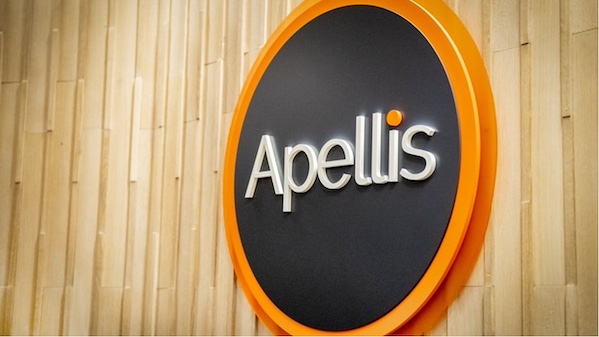Apellis parries Astellas’ long-term Izervay data with 3-year results on its rival GA med Syfovre
November 8, 2023
Source: drugdu
 523
523

After this summer’s FDA approval of Iveric Bio’s Izervay—the drug at the center of the $5.9 billion buyout by Japanese pharma Astellas—the battle for the geographic atrophy (GA) crown is on in the U.S. Now, Apellis Pharmaceuticals, which boasts embedded eye disease sales leader Syfovre, is putting up long-term data in a bid to outdo its new rival.
Touting data from its GALE extension study, Apellis on Saturday said Syfovre yielded increasing treatment effects year over year and helped patients achieve more than a 40% reduction in non-subfoveal lesion growth at the study’s three-year mark.
Apellis rolled out the latest GALE results as part of a presentation at this year’s meeting of the American Academy of Ophthalmology (AAO) in San Francisco. The timing coincides with the release of two-year data on Astellas and Iveric’s GA drug Izervay—also at AAO—which suggest the rival drug’s treatment benefit emerged in as few as six months, with the effect growing over time.
Izervay bagged FDA clearance in early August, less than four months after Astellas acquired the drug’s developer Iveric. Apellis’ Syfovre became the first drug approved for GA back in February.
Syfovre previously carried peak sales expectations of $3 billion, though the edge conferred by its early approval waned with reports of rare but serious side effects. More recently, however, Apellis’ drug has shown signs of recovery.
Aside from the reduction in non-subfoveal lesion growth—or the growth of lesions in the outer retina—Apellis’ three-year results showed that Syfovre reduced general GA lesion growth by 35% and 24% when given monthly or every other month, respectively, versus placebo.
Syfovre’s safety profile was on par with previously reported data, the company added. The company flagged one serious case of ischemic optic neuropathy in the monthly cohort, which the company previously reported. Intraocular inflammation cropped up at a rate of 0.26% per injection from months zero to 36, which excluded four cases linked to an impurity snafu from 2018.
Apellis pointed out that no cases of retinal vasculitis have been observed in its clinical studies of Syfovre, in which more than 24,000 injections have been administered.
Reports of Syfovre causing occlusive retinal vasculitis—a type of eye inflammation that can potentially cause blindness—surfaced in July after the American Society of Retinal Specialists flagged instances of the rare but serious side effect in a letter to doctors.
At the time, an Apellis spokesperson told Fierce Pharma the drug’s overall real-world safety profile had been “consistent” with its clinical trials.
In August, Apellis said problems with a filter needle included in certain Syfovre injection kits could be behind the side effect streak.
The company stopped short of declaring a causal relationship but recommended healthcare providers immediately stop using injection kits containing the specific filter needle.
As of early October, Apellis had reported 10 confirmed retinal vasculitis events, which worked out to a 0.012% chance per injection, according to analysts with Evercore ISI.
Despite the side effect issue, recent shipping patterns suggest “doctors do appear to be moving on from the vasculitis scare in July,” the analysts wrote in a note to clients last month.
Meanwhile, Astellas is busy making the case for long-term use of Izervay. At AAO, investigators shared two-year results from the GATHER2 study, which tested the drug every month or every other month against placebo in GA patients.
In Year 2 of the study, Izervay met its primary objective by delivering a statistically significant year-over-year reduction of 14% in the mean rate of GA lesion growth. When given every other month in Year 2 after monthly dosing during Year 1, Izervay yielded a 19% reduction in the mean rate of GA lesion growth.
That said, the Astellas drug failed a prespecified objective looking at its ability to reduce vision loss.
https://www.fiercepharma.com/pharma/apellis-parries-astellas-long-term-izervay-data-3-year-results-its-rival-geographic-atrophy
By editorRead more on
- The first subject has been dosed in the Phase I clinical trial of Yuandong Bio’s EP-0210 monoclonal antibody injection. February 10, 2026
- Clinical trial of recombinant herpes zoster ZFA01 adjuvant vaccine (CHO cells) approved February 10, 2026
- Heyu Pharmaceuticals’ FGFR4 inhibitor ipagoglottinib has received Fast Track designation from the FDA for the treatment of advanced HCC patients with FGF19 overexpression who have been treated with ICIs and mTKIs. February 10, 2026
- Sanofi’s “Rilzabrutinib” has been recognized as a Breakthrough Therapy in the United States and an Orphan Drug in Japan, and has applied for marketing approval in China. February 10, 2026
- Domestically developed blockbuster ADC approved for new indication February 10, 2026
your submission has already been received.
OK
Subscribe
Please enter a valid Email address!
Submit
The most relevant industry news & insight will be sent to you every two weeks.



